The 158-member Central Committee of the WCC adjourned in Potsdam Tuesday afternoon (February 6) after an historic nine-day meeting - the first in an united Germany - that focused on reconciliation and formally launched the WCC's Decade to Overcome Violence (DOV).
The DOV: Churches Seeking Reconciliation and Peace (2001-2010), began with a Saturday night vigil and Sunday worship (February 4) in the bomb-scarred Gedächtniskirche (Memorial Church) in downtown Berlin. The ceremonies concluded with a candle-lit march in the snow from the Berlin House of World Culture to the Brandenburg Gate, where Committee members pledged "to work together to end violence and build lasting peace and justice".
Themes of reconciliation and justice were woven throughout the Committee's busy agenda. The Special Commission on Orthodox Participation in the WCC is about half-way through its work but Central Committee members said they were optimistic about its progress. The Commission's mandate is to propose changes "in the structure, style and ethos" of the WCC. One proposal already attracting attention - and vigorous discussion - is that the Council make decisions by consensus rather than majority vote.
Noting the press of business facing the Council due to probable changes to be recommended by the Special Commission and other items, the Central Committee extended the term of WCC general secretary Konrad Raiser by one year to December 2003.
The Central Committee's moderator, H.H. Aram I, sparked a debate when he raised the question of whether Christians should accept the use of violence for humanitarian intervention. After much discussion, the Committee decided to send a report on the issue to the member churches of the WCC "for further study, reflection and use as they deem appropriate".
The Central Committee called upon the WCC to "continue their efforts towards a negotiated peace in the Middle East based on international law." Other public issues included a call on Sudan to cease bombing of civilians, opposition to the US "Plan Colombia" to provide military support to that nation, an appeal for the just reunification of Cyprus, and a call upon Indonesian leaders to seek a peaceful resolution to the conflict there.
The Central Committee reaffirmed its position that industrialised countries "bear the major moral responsibility for precipitating climate change" and asked member churches in those countries to encourage their governments to reduce emissions.
In a plenary on global economic issues, several members stressed the unjustness of the foreign debt many poor nations owe to rich creditors like the World Bank or International Monetary Fund. Bishop Aldo Manuel Etchegoyen (Evangelical Methodist Church of Argentina) said the debt is "immoral" and claimed that the church is the only institution speaking out against it.
Ecumenical challenges in the Central Committee's host nation were presented by several German church leaders. Nearly a third of German's 82 million citizens are not church members or are believers of other faiths, according to the Rev. Tim Kuschnerus of the Evangelical Church in Germany. "Our great challenge now," said Bishop Dr. Walter Klaiber of the Evangelical Methodist Church in Germany, "is to voice God's 'yes' to people... who may not want to know."
The membership of the Council increased to 342 churches with the approval of the following new members: Evangelical Lutheran Church in Namibia, Convention of Philippine Baptist Churches, Ekalesia Niue (the Island of Niue is near Aotearoa-New Zealand), Evangelical Lutheran Church of Ghana, Africa Inland Church, Sudan, Association des Eglises baptistes au Rwanda (Association of Baptist Churches in Rwanda). Mara Evangelical Church, Myanmar (formerly Burma), was accepted as an associate member. Two new churches, the result of mergers of member churches, were recognised as full WCC members. United Reformed Church, Scotland, was formed from the merger of the Congregational Union of Scotland and the United Reformed Church in the United Kingdom. Uniting Presbyterian Church in Southern Africa was formed from the merger of the Presbyterian Church in Southern Africa and the Reformed Presbyterian Church in Southern Africa.
The Central Committee decided that the Ninth Assembly of the World Council of Churches will be held in 2006, but specific dates and a venue for the meeting were not discussed.
The Programme Committee's recommendation to hold a Conference on World Mission and Evangelism in late 2004 or early 2005 was affirmed. The Programme Committee also recommended that the Central Committee meeting in 2002 offer a session reflecting on the issues of disability.
Several high-ranking German officials greeted the meeting, most notably Dr Johannes Rau, president of the Federal Republic of Germany. Rau noted that the last time the Central Committee met in Germany was 13 years ago when the country was divided. "No one would have dared dream the next meeting would take place in a united Germany," he said. The president said governments have a responsibility to serve the poor. "We must continue to work for a world... that embraces justice, peace and one that overcomes violence," he said. Also greeting the Central Committee was Dr Manfred Stolpe, premier of Brandenburg, the state that includes Potsdam.
Two delegated observers from the Roman Catholic Pontifical Council for Promoting Christian Unity were active listeners at all sessions, Msgr John Mutiso-Mbinda and Msgr John A. Radano.
|
For more information, you may wish to consult the following ...
Reports
|
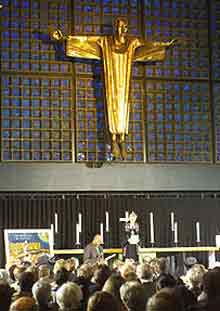
Worship at the launch of the
Decade to Overcome Violence
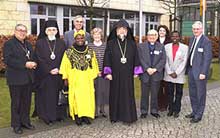
Presidents & Officers of the WCC
from left to right, Rt Rev. Jabez Bryce, H.E. Metr. Chrysostomos of Ephesus, Justice Sophia Adinyira, Rev. Dr Konrad Raiser, Dr Marion Best, H.H. Aram I, Bishop Federico Pagura, Rev Kathryn Bannister, Dr Agnes Abuom, Bishop Eberhardt Renz
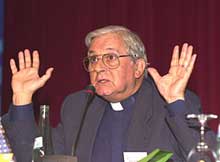
Bishop Aldo Etchegoyen
Evangelical Methodist Church of Argentina
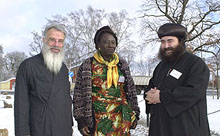
Archibishop Tillyrides of Zimbabwe
Ms Ngoyi Mukuna Misengo (DR Congo)
Bishop Anba Youannes (Cairo, Egypt)
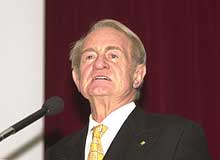
Dr Johannes Rau
President of the Federal Republic of Germany
